Episodes
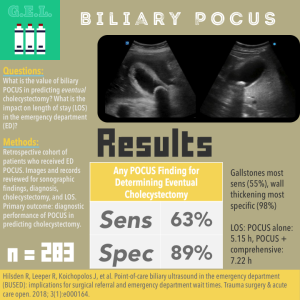
Monday Feb 04, 2019
Biliary POCUS & Surgical Referral
Monday Feb 04, 2019
Monday Feb 04, 2019
The gallbladder loves to be scanned - a fluid filled sac nestled against a wonderful acoustic window? Are you kidding me? In any case, here is what we know: ultrasound is good for diagnosing cholecystitis, point of care ultrasound in the emergency department is good for diagnosing cholecystitis, BUT many surgeons still prefer a comprehensive RUQ ultrasound prior to cuttin' anyone. This article takes a look to see if these positive findings in the ED lead to people requiring cholecystectomy. Also - does it actually save time? https://www.ncbi.nlm.nih.gov/pubmed/30109274
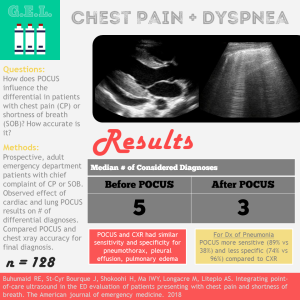
Monday Jan 21, 2019
Chest Pain and Shortness of Breath
Monday Jan 21, 2019
Monday Jan 21, 2019
Chest pain is fun, right? Maybe add in some shortness of breath? It can be hard to sort through the potentially sick from the okay to go home. We know that point of care ultrasound (POCUS) can be helpful in making or excluding many cardiothoracic pathologies, but we don't even know if it really makes a difference! This article takes the first step by asking, "when you use POCUS, does it help lower the diagnostic uncertainty about that patient?" Secondly, it takes on an old rivalry by comparing POCUS to chest xray in these patients. https://www.ncbi.nlm.nih.gov/pubmed/30413369
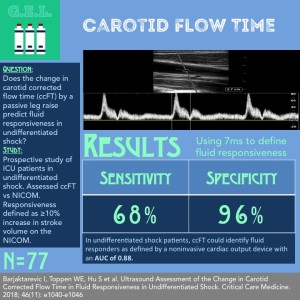
Monday Jan 07, 2019
Carotid Flow Time for Fluid Responsiveness
Monday Jan 07, 2019
Monday Jan 07, 2019
Fluid responsiveness has been all the rage in emergency and critical care medicine. Trying to determine which patients will benefit from fluids or how much fluids is a daily struggle for providers. However, every new measurement or technique to quantify a patients possible responsiveness to fluids has been riddled with problems. Is carotid flow time, the holy grail that we have been waiting for? This study dives into the use of carotid flow time in an ICU patient population and attempts to answer if flow time can predict fluid responsiveness.
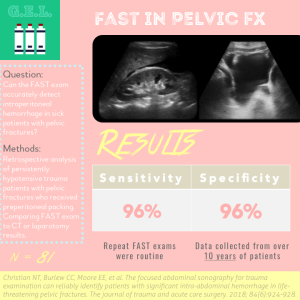
Monday Dec 10, 2018
FAST for Hemorrhage from Pelvic Fracture
Monday Dec 10, 2018
Monday Dec 10, 2018
The FAST exam is tried and true for trauma, but in the past it hasn't been super useful for patients with isolated pelvic fractures. This study teases out a very sick subset of this population - patient who have significant hemorrhage associated with their fracture. The question is how well can the FAST identify intraabdominal hemorrhage in these people. The authors' idea is that if the FAST can find intraperitoneal blood, it might help determine who would benefit from REBOA instead of laparotomy.
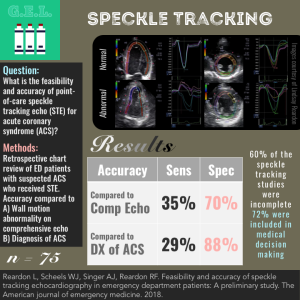
Monday Nov 26, 2018
Speckle Tracking for Acute Coronary Syndrome
Monday Nov 26, 2018
Monday Nov 26, 2018
Speckle tracking? Is that the technology that the government uses to mine data from your phone?! No - totally different! This is an ultrasound technology that recognizes tiny specks in the myocardium, allowing for a measurement of the movement of the heart wall. This has the potential to quantify the contractility of different parts of the heart, and therefore can be used to help diagnose numerous cardiac pathologies. At this time, not many people are using this in the emergency department. This is the first study to take a look to see if this is feasible and if it is accurate in diagnosing patients with acute coronary syndrome.
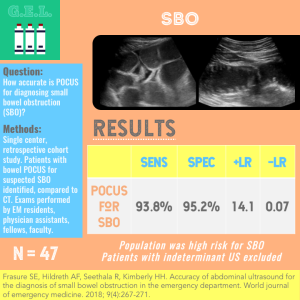
Monday Nov 12, 2018
Small Bowel Obstruction
Monday Nov 12, 2018
Monday Nov 12, 2018
Ultrasound was made for the diagnosis of small bowel obstruction. It loves when air filled things are turned into fluid filled things - its helps us see it better. When the bowel gets backed up and distends with digested cheeseburgers, ultrasound is there to save the day. As easy as this may seem, it has not been well studied. There are a few small studies that show it can be accurate compared to a CT, but without a large body of evidence - a lot of people are (quite reasonably) unwilling to put their faith in it. Well, we can't say this study is going to turn all that around, but its one more piece of the puzzle of figuring out how we can use POCUS for this diagnosis.
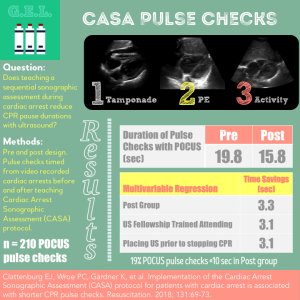
Monday Oct 29, 2018
Cardiac Arrest Protocol for Shorter Pauses in CPR
Monday Oct 29, 2018
Monday Oct 29, 2018
Are you sick of hearing about ultrasound and cardiac arrest? Do you think to yourself - "Why can't everyone just do it my way?." Well - for better or for worse (we think for the better), there are going to be more and more ultrasound and cardiac arrest articles. The reason is that point of care ultrasound can help so much in this situation, yet - it has also been shown to put people at risk for longer times without CPR. So what do we do? This article presents the CASA exam, a cardiac arrest ultrasound protocol, as a way to standardize the exam and (hopefully) minimize pauses in CPR.
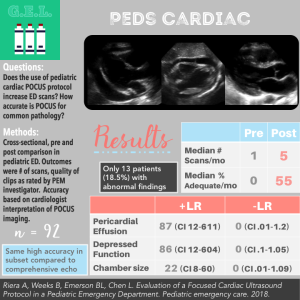
Monday Oct 15, 2018
A Pediatric Cardiac POCUS Protocol
Monday Oct 15, 2018
Monday Oct 15, 2018
The pediatric literature for point of care ultrasound seems to lag behind that of adults. However, it has made some incredible strides to show that this is a tool that is not be neglected in our younger patients. Although point of care ultrasound is used routinely in adults, it may not be as frequently employed in the pediatric emergency department. Clearly, there are differences in cardiac pathology encountered in pediatrics, but the ultrasound can still have great utility. The authors of this paper seek to increase the use of cardiac POCUS by collaborating with cardiologists to create a focused cardiac ultrasound protocol. They collect data to see what happened to POCUS use after they institute this protocol and to see how accurate these scans hold up in kids!
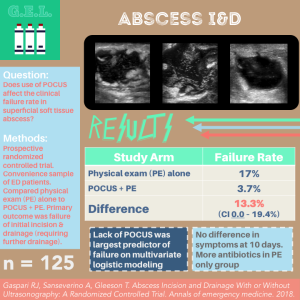
Monday Oct 01, 2018
The Effect of POCUS on Abscess Treatment Failure
Monday Oct 01, 2018
Monday Oct 01, 2018
We know that ultrasound can be used to diagnose a superficial cutaneous abscess. That is NOT what this study is about. Forget diagnosing! What about actually helping your patients stay out of the emergency department? These authors performed this study with the hypothesis that using POCUS during the treatment of a superficial abscess might decrease the failure rate of the incision and drainage. That means ultrasound could help prevent patients from requiring additional treatment! They aren't messing around with retrospective chart reviews either - this is a real live randomized controlled trial.
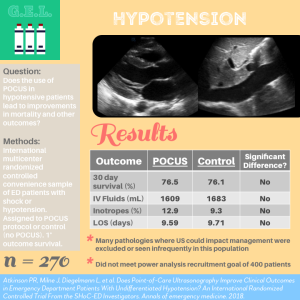
Monday Sep 17, 2018
POCUS in Hypotension
Monday Sep 17, 2018
Monday Sep 17, 2018
Well the dust has somewhat settled from the initial explosion that this article made when it first hit street corners everywhere. The authors here took on an important question - does point of care ultrasound make a difference in mortality when applied to patients in shock? [SPOILER ALERT] It led to quite a stir when the trial concluded that (I'm paraphrasing here) - "POCUS doesn't help people". Although that conclusion may or may not be the case, this study was a well performed randomized controlled trial. Therefore, you need to know about it and where to go from here.

